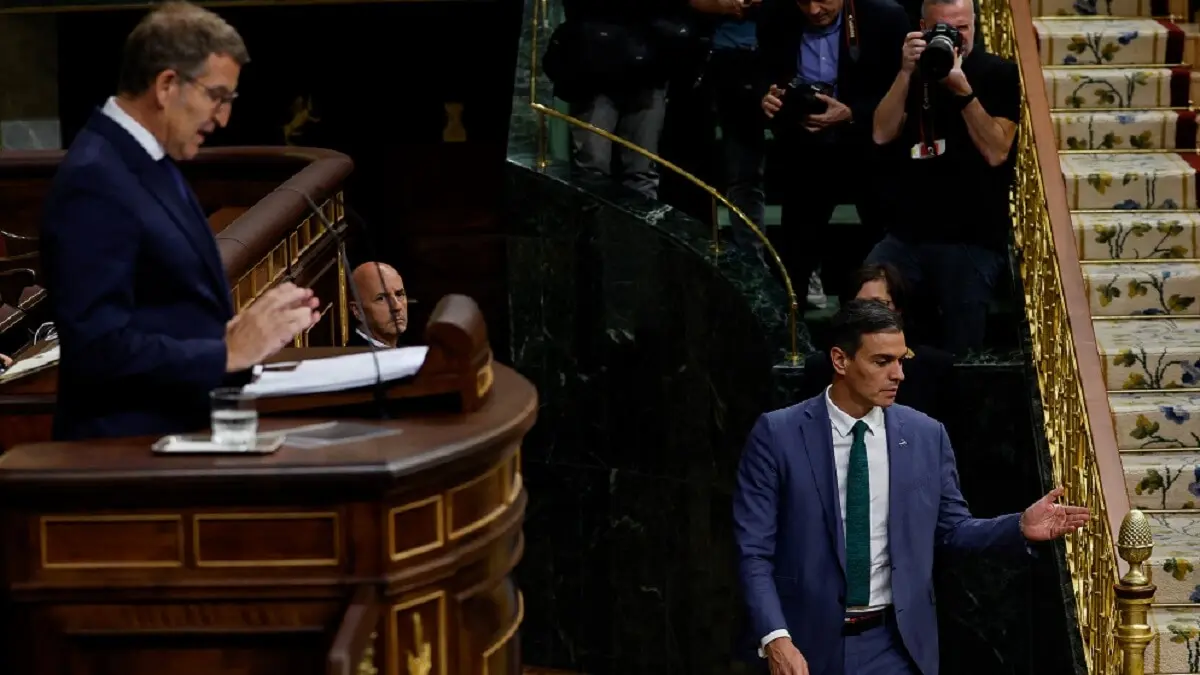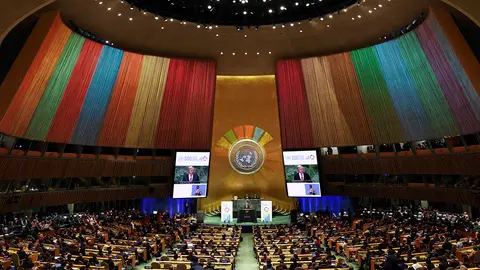St. Jerome's Race

This Spain is different; it is becoming more and more like a Latin American country than a European one. There is a political-partisan maelstrom and an ideological debate around the big national issues that are eroding the increasingly fed-up and self-absorbed citizens' coexistence.
Tuesday's long debate on what is already a failed investiture by Alberto Núñez Feijóo, the winner of last July's general elections, is the most irrefutable example of how crass populism ends up phagocytising everything around it as if it were a cancer that is gradually taking over an organ.
Núñez Feijóo, who has won, will not be able to be president because this is what parliamentary democracy is all about, in which King Felipe VI is the head of state and entrusts the winner of the general elections to form a government and to do so he needs an absolute majority in the Congress of Deputies; that is, 176 seats/votes by the deputies (out of a total of 350 deputies) or else try for a simple majority, this arithmetical formula only needs more yeses than noes.
The winner led by the centre-right Partido Popular (PP) will not only not be invested by an absolute majority, he will also fail to win a simple majority, as Feijóo will try to do on Friday.
On the St. Jerome's Race, Feijóo arrived surrounded by his 136 legislators, just before entering the chamber to begin the investiture debate. He arrived with a state politician's speech to defend the unity of Spain and the Constitution.
He argued at the rostrum that if he were to govern Spain, he would create a crime of "constitutional disloyalty", in allusion to what the current acting president, the socialist Pedro Sánchez, is negotiating with the Catalan nationalist and pro-independence groups in relation to the granting of amnesty to both the Procés prisoners and the politicians on the run for organising the illegal referendum for independence on 1 October 2017.
But, in addition, there is the issue that floats in the air: that Sánchez is negotiating with Catalan pro-independence political parties the possibility of organising another referendum in Catalonia to decide its self-determination. All in exchange for them to vote for him... to make him president for another four years.
Feijóo, who received the most votes in the elections, has been soured by the fact that he only has the far-right VOX on the right to make a pact, which for a group of Spaniards is as much as resurrecting Franco.
There are citizens who are more afraid that VOX will enter the Spanish government than that a populist Sánchez will be capable of agreeing an amnesty and even self-determination with Catalonia.
This is the current dilemma for citizens: a PP that, if it does not obtain an absolute majority in the votes, only has the possibility of making a pact with the ultra-right; and a populist left, much more organised, that is capable of making a pact with all the other parties, even if they are at the antipodes of progressive ideology and are anti-Spanish.
Moreover, in recent years, the only parties that have benefited most from the breakdown of the two-party system in Spain are precisely the nationalist and pro-independence parties. While the political coexistence between the PP and the PSOE is being eroded, the Basque and Catalan parties are essentially cutting corners in the Congress of Deputies.
On the subject
Much is changing: not only is there a political incapacity for dialogue between the two major parties at the heart of Spanish democracy, but now debates in Parliament are also taking place in co-official languages: Basque, Galician or Catalan.
Legislators take to the podium to speak in their own languages and translators are hired to translate everything into Spanish; yet another additional expense to which the incumbent Sánchez committed himself as part of his commitments to the pro-independence and nationalist groups. He has also tried, in the European Parliament, to ask for debates in those languages and Sánchez even offered that Spain would pay the cost of translators.
There is a cult of personality in the Moncloa that is reminiscent of many Latin American leaders, lies persist in the speeches; the distortion of reality and even the economic figures are being tampered with, official bodies and institutions are being contaminated; government bodies and neither the legislature nor the judiciary escape this rabid populism.
If these last four years the PSOE's pact with the ultra-left of Unidas Podemos has left a disaster in terms of laws, policies, friction with institutions and many sectors, above all an irrational persecution of businessmen, another four more years of the self-styled progressive government, this time an edition of the PSOE with the ultra-left of Sumar (a rehash of the podemites) will only continue to lubricate hatred, citizen and ideological confrontation, nourishing itself by bringing people out onto the streets to defend banners such as feminism and will continue to impose an ideological stamp on a new morality that runs through Spain in which sexual awakening is exalted; sexual freedom; early sexual initiation and the exploration of diverse sexual identities. The unfortunate thing is that there is a centre voter totally abandoned because there is no party to identify with... there is a huge vacuum in this ideological space and if one does not emerge soon, Spain will have many long years of noxiously populist governments, unfortunately.



